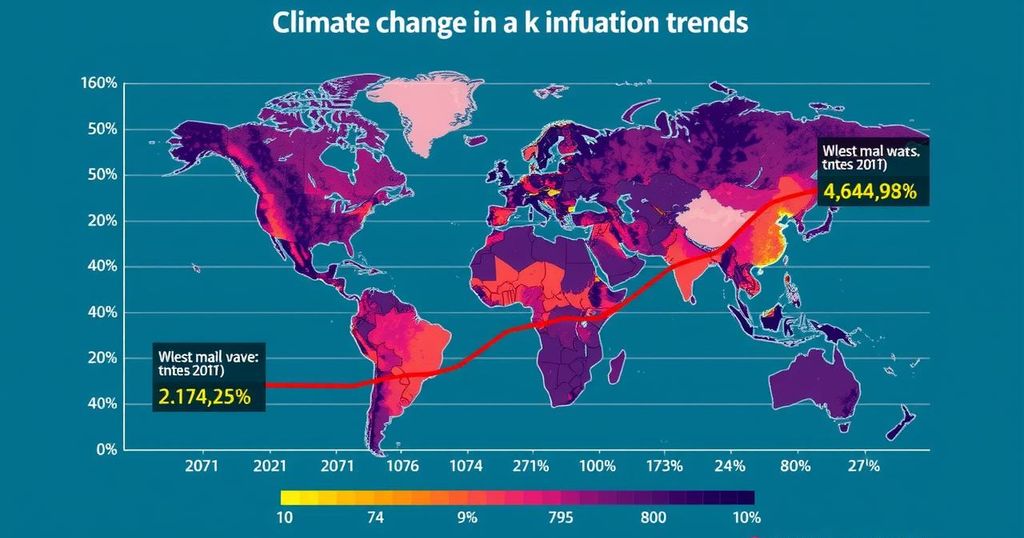The climate crisis and inflation are interconnected, with rising global prices for essentials largely driven by climate impacts such as extreme weather. This situation is particularly dire in Africa and Latin America, where food spending constitutes a large share of household budgets. Policymakers must integrate climate considerations into economic policies to address these dual crises effectively and ensure resilience against economic and environmental shocks.
The climate crisis, intricately linked to rising inflation, manifests through escalating prices of essential goods such as food and energy. Recent trends indicate that extreme weather events—exacerbated by climate change—are increasingly damaging crops, leading to soaring food costs and disrupted supply chains. This phenomenon disproportionately affects regions like Africa and Latin America, where food expenditures constitute a significant portion of household budgets, thereby amplifying economic vulnerability. The interplay of inflation and climate change necessitates a reevaluation of economic policies to address both immediate and long-term effects of these interrelated crises.
Moreover, ignoring the economic ramifications of climate change proves detrimental to the most vulnerable populations, while focusing solely on green growth diverts attention from urgent issues of inequality. A comprehensive approach to economic policies should integrate climate risks, as evidenced by initiatives from institutions such as the South African Reserve Bank and the Central Bank of Costa Rica, which have begun to incorporate climate considerations into their economic models.
Efforts like the African Climate Foundation’s Adaptation and Resilience Investment Platforms (ARIPs) exemplify how advanced analytics can guide investment decisions and inform policy in the wake of climate-induced impacts. Such collaborative endeavors, alongside regional partnerships, can cultivate economic policies tailored to specific climate vulnerabilities. The need for cohesive global strategies is underscored by the potential consequences of climate-related economic instability, emphasizing the urgency for integrated solutions.
With global coordination between climate and economic institutions as crucial as ever, upcoming policy dialogues, particularly in Brazil and South Africa, present pivotal opportunities to align strategies to combat both inflation and climate change effectively. Therefore, a concerted and innovative approach by policymakers is essential to mitigate the risks posed by extreme weather events while fostering resilience in economies worldwide.
The intertwining of the climate crisis with the economic phenomenon of inflation highlights an urgent global concern requiring concerted attention. Rising prices of food, energy, and other basic necessities have become pressing issues, particularly in G20 countries, with governments and policymakers struggling to address these challenges. As adverse weather events linked to climate change increase in frequency and severity, their impact on agricultural production and supply chains becomes more evident, leading to a pressing need for a holistic approach that considers both climate resilience and economic stability.
In summary, the interplay between climate change and inflation demonstrates a critical need for integrated economic strategies that address both challenges concurrently. Policymakers must prioritize incorporating climate risks into economic planning, fostering collaboration between financial institutions and climate organizations. By developing innovative solutions that bridge these domains, they can mitigate the adverse effects of extreme weather while promoting economic stability and protecting vulnerable populations, thus paving the way for a more resilient future. Acting decisively on this front is paramount to achieve both economic and climate objectives and to safeguard the well-being of communities globally.
Original Source: koreajoongangdaily.joins.com






